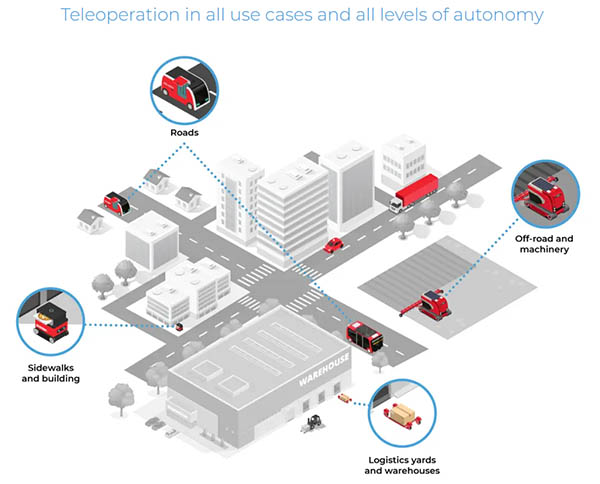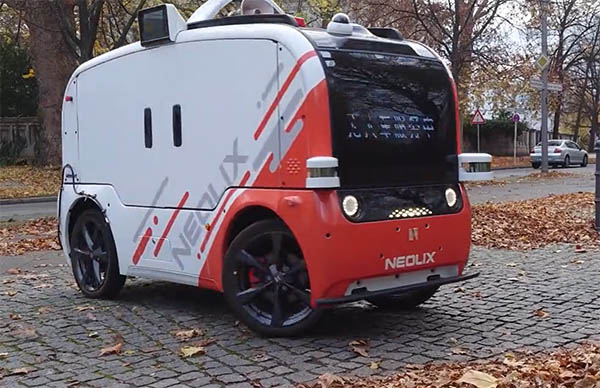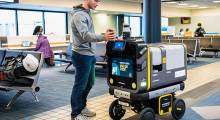Teraki GmbH and Driveu Tech Ltd. yesterday said they have collaborated to integrate DriveU.auto's connectivity platform for remote operations into Teraki's operational European fleet of delivery robots. The companies said their partnership will enable safe, real-world, commercial deployment of mobile obots at scale through teleoperation.
“We are extremely proud to name Teraki as our partner and customer,” said Alon Podhurst, CEO of DriveU.auto. “Accelerating the wide-scale deployment of robots and autonomous vehicles is a herculean effort that is being achieved through a concentrated effort of technology partners.”
“Teleoperation is a key enabling technology for commercial deployment of robots and autonomous vehicles, demanding a best-in-class approach in multiple disciplines,” he added. “We share this vision with Teraki, and are already seeing market demand and traction for our joint offering.”
Ra'anana, Israel-based DriveU.auto has developed and is deploying software that enables both remote driving (also known as direct drive) and high-level commands (or remote assistance) at very low latency and high reliability. Its teleoperation technology is based on proprietary cellular bonding and dynamic video encoding technologies.
The company said its customers and partners include autonomous vehicle developers, makers of delivery robots, OEMs, and Tier 1 automotive suppliers. They have been using the DriveU.auto platform on roads in the EU, U.S., China, Japan, and Israel.

Teleoperation a necessary step toward autonomy
Driverless vehicles are entering a new phase: mass deployment and commercialization, according to DriveU.auto and Teraki. In this phase, mobile robot and self-driving vehicle operators must scale large fleet operations in the real world.
Teraki claimed that it selects and processes only the relevant information from large amounts of sensor data. It said its preprocessing algorithms can improve the accuracy of subsequent artificial intelligence models by 20% through efficient edge processing for the extraction of high-quality noiseless data in normal and difficult conditions.
Teraki makes it possible to run these models at the lowest latency on low-powered hardware—a requisite for high volumes of series production. The startup, which has more than 50 employees and offices in Berlin and Tokyo, said its use cases include SAE Level 2 to 4 cars, trains, and delivery robots.
As Teraki continues to expand robotic deliveries to new countries and customers, its robots will not be 100% autonomous from Day 1. Having a “human in the loop” on call to intervene when a robot requires assistance is a “must have” for safe operations in public spaces, noted the company.
Teleoperation for robots, drones, and autonomous vehicles in the public domain relies on uninterrupted, high-quality video. This requires a continuous, high-quality, and low-latency connection between the vehicles and the remote operators, said Teraki and DriveU.auto.
Communication between the vehicle and the remote operator is currently done over public cellular networks, explained the partners. Fast and uninterrupted transmission of the video stream is key to a safe operation.
However, the need for a high-quality, reliable, and low-latency video stream from the vehicle to the remote operator is at odds with the highly unstable and dynamic nature of cellular networks. This is a significant challenge for the commercial deployment of robots and autonomous vehicles in urban environments, said the companies.
DriveU and Teraki integrate tech for robustness
DriveU said it has integrated its connectivity platform into Teraki's delivery robot, providing it with “superior connectivity” for teleoperation. The platform can scale up to thousands of robots through a cloud-based implementation, said the companies.
The duo has built a product offering that combines Teraki's edge pre-processing algorithms and DriveU.auto's software-based connectivity platform to ensure efficient video transmission. The solution is already live in Teraki's European delivery robot deployments and is now available to selected partners.
“The past two years have ushered in the 'age of delivery,' in which Teraki and its partners play a key role,” said Daniel Richart, CEO of Teraki. “Our embedded, pre-processing AI-software, combined with DriveU's state-of-the-art teleoperation offering for robots and autonomous driving in cities, has passed rigid safety tests and been proven and implemented with top companies.”
“Our robots ensure efficient and emission-free deliveries that solve main last-mile delivery challenges such as courier shortages and negative unit economics,” he said.
Article topics
Email Sign Up















